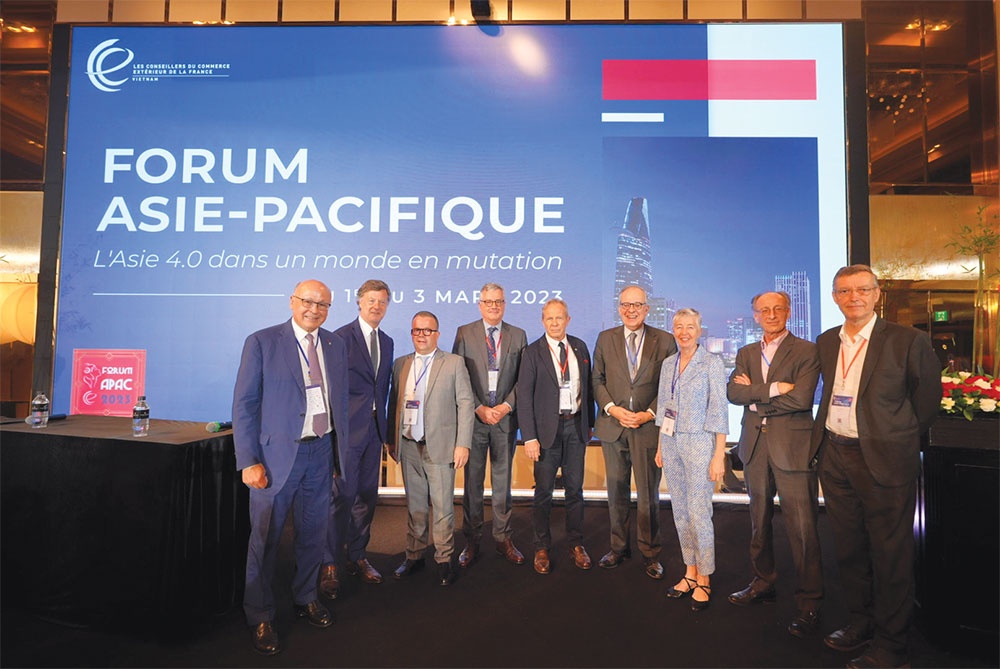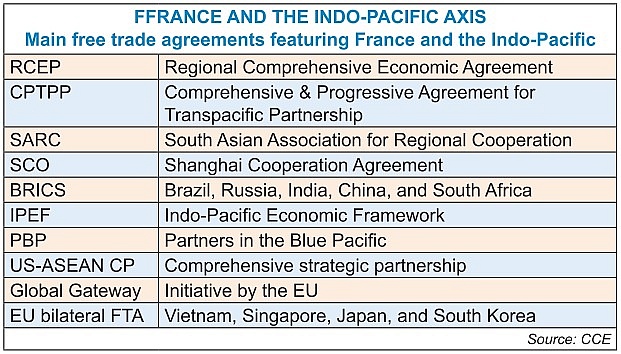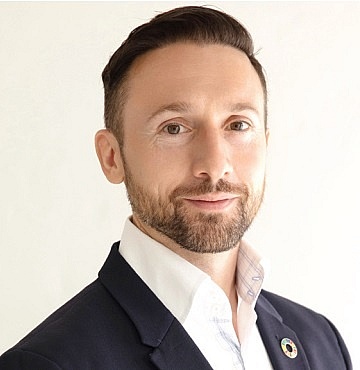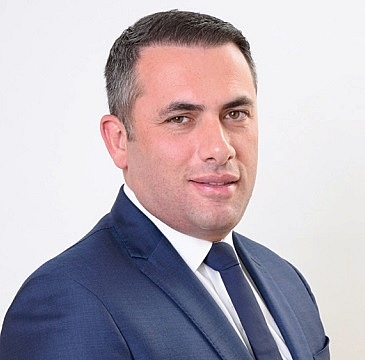France trailblazing in sustainable development
 |
| A range of voices were heard at last week’s CCE APAC 2023 forum |
French Foreign Trade Minister Olivier Becht last week emphasised Vietnam’s importance as part of France’s Indo-Pacific strategy and the government’s support for strengthening France’s economic presence in the region.
According to Becht’s speech at a forum for French foreign trade advisors in Asia-Pacific (CCE APAC 2023) in Ho Chi Minh City, France continues to act as the driving force in advancing EU countries for stronger collaboration with Indo-Pacific countries and organisations.
As a key member of ASEAN, Vietnam hosts nearly 170 subsidiaries of France-based groups, accounting for some 24,000 jobs. “French businesses place a significant interest in Vietnam’s investment opportunities, and want to accelerate the implementation of key economic projects, including the Nhon-Hanoi urban railway route,” he said.
On a broader scale, France is striving to ensure that the significance of cooperation between the EU and ASEAN, as well as Indo-Pacific region, is properly represented through the EU’s Global Gateway scheme.
“This is a new strategy to boost smart, clean, and secure links in digital, energy, and transport sectors and to strengthen health, education, and research systems across the world,” said CCE president Alain Bentéjac.
“For Vietnam’s infrastructure, some French companies are discussing a highway connecting Hanoi and Ho Chi Minh City. Of course, it is a long-term project because of the distance between the two cities. We believe with international expertise, French corporations could aid Vietnam to realise this goal,” Bentéjac added.
Cesar Purisima, former Finance Minister of the Philippines, also highlighted the critical role of France at the forum. “I think the most important feature of the partnership should focus on the technical and technological transfer between French and Southeast Asian firms and founders by fostering links, mentorship programmes, and collaborative platforms,” Purisima said.
France and ASEAN trade counsellors can roll out the least capital intensive but most impactful efforts to contribute to the green economy, he added. “Regarding climate change, we are thankful that France has consistently been the global champion of discourse, with the landmark Paris agreement to limit global warming. The Paris Agreement also established a new connection mechanism to help developing countries transition to lower carbon economies and adapt to the impacts of climate change.”
Experts at the event last week exchanged their thoughts on energy transition, smart cities, and digital healthcare disruption, among others.
“Asia depends on a massive amount of fossil fuel. We need to think about the accessibility and price of energy, especially carbon emissions produced as the result of energy production and consumption,” said François Amman, co-president of Aden Group.
Thierry Blandinieres, CEO of French farming cooperative InVivo, added, “If we know how to work intelligently, we can ensure fewer emissions. Food can be produced completely without emissions and energy production can be decarbonised.”
Blandinieres added that vertical farms in Singapore are an inspiration. “Vertical farms have great potential in Asia due to favourable weather. They allow us to reconnect with the city.”
Maïa Maniglier, a representative of CCE Japan, shared that Toyota and ENOS’ construction of a 175-acre smart city at the base of Mount Fuji is also a trailblazer for smart city development as well as sustainable energy advancement. “The project is slated to be fully sustainable, powered by hydrogen fuel cells, and moves us closer to making society carbon-neutral,” Maniglier said.
At last week’s forum, a representative of French-Italian chipmaker STMicroelectronics, the world’s third-largest maker of microcontroller chips, said there are alluring opportunities in semiconductor production in ASEAN.
“As the downstream electronics assembly business expands, we anticipate significant growth and demand for semiconductors in these nations,” the representative said. Furthermore, as electric vehicles are gaining popularity, we are putting more emphasis on wide-bandgap semiconductors in order to enable future growth and increase our footprint.”
Purisima of the Philippines believed that e-commerce and fintech industries in ASEAN are growing rapidly, and France has been actively involved in this opportunity, which could yield significant potential to drive economic growth.
“For example, a few years ago the French government and the Monetary Authority of Singapore signed a fintech cooperation agreement to facilitate collaboration between fintech companies. In 2021, France and Vietnam also signed an MoU to enhance cooperation in digital transformation,” he said.
CCE APAC 2023 saw the participation of nearly 500 executives, with the presence of prominent French businesses including Louis Dreyfus, SNECI, Bpifrance, Andros, and Air France, to name a few.
 |
| Harold Pradal-Chief commercial officer BSI Group | |
When considering how their organisation can operate more sustainably, senior executives must adapt to the global context of economic, energy, and climate crises. Of course, even with the best-laid plans, we are in a world where disruption is likely to shift priorities. So how can the leaders of tomorrow respond to social, technological, and geopolitical shockwaves? We have seen the impact on our environment when organisations and their leaders adopt a business-as-usual approach. Sustainability involves moving away from operations and legacy ways of working that hinder change. There are three key elements for leaders of organisations to consider when aligning to sustainability goals. The first element is the need for an adaptive, creative mindset. Being in a state of constant flux is, and will remain, the new normal. Organisations must understand the nature of uncertainty and volatility. Responding to this challenge requires a generation of leaders who thrive in an environment where change is the expectation, not the exception; leaders who recognise that our future will not be linear and who can see the bigger picture, while adjusting their business models and processes accordingly. Secondly, the adoption of developing technologies such as AI will be critical in realising sustainability objectives. AI continues to shape our world and will increasingly do so in the coming years. While there are some reservations around the development and utilisation of AI, it’s important to embrace these developments and focus on the benefits. Technology can help solve the world’s biggest problems faster, stimulating the journey to sustainability. An effective leader will look at what they can achieve with these new tools whilst understanding the safeguards needed to ensure it works for everyone. Furthermore, organisations can benefit from an unrelenting focus on talent development. Leaders who can thrive in this disruptive environment are vital if we are to achieve our sustainability ambitions. That’s why organisations should be prioritising, nurturing and enabling new skills and talents. Those leaders who focus on talent development will be the ones best equipped to use their ability and vision to lead their workforces into new areas of possibility, efficiency, and growth. Ultimately, it’s not just about getting ready for what the future holds but being the change-makers ensuring that our future is a sustainable one. As I’ve learned from leaders I’ve worked with, those who are ready and able to see challenges as opportunities and embrace change will be better positioned to lead their organisations to be more sustainable and resilient. | |
| Elie Chaillot-President and CEO GE HealthCare Intercontinental | |
Over the past 30 years, we have been unrelenting in our efforts to build a stronger healthcare sector. More than half of the clinics and hospitals in Vietnam are equipped with at least one of our technologies. Many of the latest innovations in ultrasound, magnetic resonance, and anaesthesia have been brought to the Vietnamese market by GE HealthCare. Digital and AI, which are embedded in many of our technologies, have been strongly adopted in the Vietnamese healthcare sector and are helping improve productivity and affordability. Our long-term vision and commitment to the market also includes supporting education and training that help improve clinical care areas. |
What the stars mean:
★ Poor ★ ★ Promising ★★★ Good ★★★★ Very good ★★★★★ Exceptional
Related Contents
Latest News
More News
- Internal strengths attest to commitment to progress (February 19, 2026 | 20:13)
- Vietnam, New Zealand seek level-up in ties (February 19, 2026 | 18:06)
- Untapped potential in relations with Indonesia (February 19, 2026 | 17:56)
- German strengths match Vietnamese aspirations (February 19, 2026 | 17:40)
- Kim Long Motor and AOJ Suzhou enter strategic partnership (February 16, 2026 | 13:27)
- Haiphong welcomes long-term Euro investment (February 16, 2026 | 11:31)
- VIFC in Ho Chi Minh City officially launches (February 12, 2026 | 09:00)
- Norfund invests $4 million in Vietnam plastics recycling (February 11, 2026 | 11:51)
- Marico buys 75 per cent of Vietnam skincare startup Skinetiq (February 10, 2026 | 14:44)
- SCIC general director meets with Oman Investment Authority (February 10, 2026 | 14:14)



 Tag:
Tag:![[Infographic] AMATA: Industrial and Smart City Developer](https://vir.com.vn/stores/news_dataimages/2026/022026/12/16/croped/amata-industrial-and-smart-city-developer-20260212165823.jpg?260212050401)



















 Mobile Version
Mobile Version